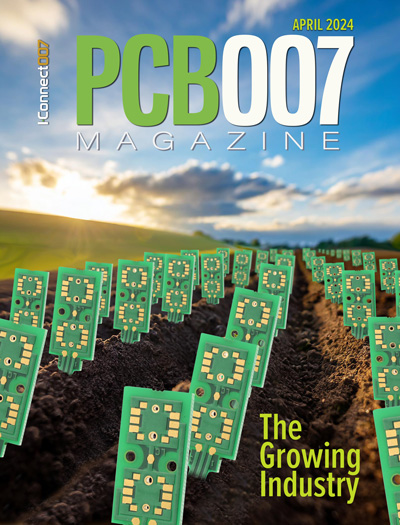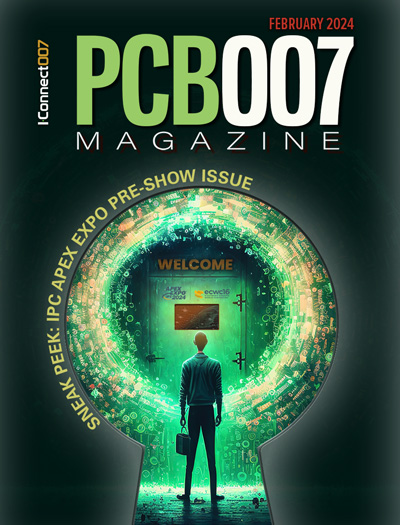-

- News
- Books
Featured Books
- pcb007 Magazine
Latest Issues
Current Issue
The Growing Industry
In this issue of PCB007 Magazine, we talk with leading economic experts, advocacy specialists in Washington, D.C., and PCB company leadership to get a well-rounded picture of what’s happening in the industry today. Don’t miss it.

The Sustainability Issue
Sustainability is one of the most widely used terms in business today, especially for electronics and manufacturing but what does it mean to you? We explore the environmental, business, and economic impacts.

The Fabricator’s Guide to IPC APEX EXPO
This issue previews many of the important events taking place at this year's show and highlights some changes and opportunities. So, buckle up. We are counting down to IPC APEX EXPO 2024.
- Articles
- Columns
Search Console
- Links
- Events
||| MENU - pcb007 Magazine
Prototron Receives MIL-31032 and AS9100 Certifications
October 22, 2019 | Steve Williams, The Right Approach Consulting LLCEstimated reading time: 7 minutes
I recently met with Kim O’Neil—general manager of Prototron Circuits in Tucson, Arizona—to discuss the company’s recent MIL-31032 certification and how this experience prepared them for the AS9100 certification. Kim also explained why auditing is a good thing for any company’s processes and highlighted some of the areas that the auditors inspected.
Steve Williams: Kim, I want to discuss some of the improvements Prototron has made in performance and specifically to a couple of certifications you have recently added: one is MIL-31032, and the other is AS9100 Rev D. First, you received the MIL-31032 certification, right?
Kim O’Neil: That’s correct.
Williams: What did you get out of that process?
O’Neil: Prototron had been a MIL-P-55110 shop forever, and then the Defense Logistics Agency (DLA) said, “To keep that certification, you’re now going to have to get to MIL-31032.” It took our ISO quality management system (QMS) to a whole different level. We had three military people out here for three days. You think you’re good, and then you find out that lots of improvements can be made. At that time, AS9100 was going from C to D, so we decided that it would be good to do MIL-31032 first and carry that over into the AS9100.
We had several opportunities to improve the QMS from MIL-31032. The performance that we’ve had has been very good, but it had our lab do some different things, like doing all of the reporting instead of going out for group Bs all the time; it put much more responsibility on us to run the business in that manner. We had quality objectives back then, but not as many as we have now with AS9100; it steered us in the right way to prepare ourselves for us for AS9100.
Williams: Everybody I talked to who has gone through MIL-31032 tells me that that first audit is brutal and an eye-opener, where you think you’re good until they show you how you’re not as good.
O’Neil: Exactly. I told my team when the audit was upcoming that it’s not a bad thing; it’s a good thing. You’re going to get written up and everything, but they’re there to make you better. And if you buy into that, you welcome those folks; they’re another set of eyes. They tell you how to get better, and as a result, you do.
Williams: AS9100 is a quality system, and there are performance aspects to it, but with MIL-31032, they dig into if the PCBs are made correctly and are going to be reliable. They also look at drilling down into all of your processes, records, and methods, where AS9100 doesn’t do that. They’re two different things, but they work together.
O’Neil: The auditors for MIL-31032 spent lots of time in the front end, in sales, and on the floor, asking us how we do things and letting us know what needs to happen. They spent two days on the floor, talking with operators, auditing the processes. There were many opportunities to conform to their observations that made things better for us. AS9100 is more about the QMS, not so much the processes on the floor. Although they visit the site, we’ve had two surveillance audits since we were certified. Management talks to them about what their philosophy is in leadership, and how AS9100 dovetails into that, but they don’t spend much time looking at records in the lab, etc. They look for objective evidence, but it’s not anything like the way the MIL-31032 audit is constructed.
Williams: The other collateral benefit is that you’re dealing with a different class of customers in those two markets that push you a little harder than you’ve been pushed before.
O’Neil: We are dealing with customers that we have not dealt with before. The genesis of AS9100 was from our sales team. We discovered that we’re about 70–75% aerospace and defense, not so much from the military specifications, but our customers are that way. They started coming back and giving us a heads up that the company is not just going to accept the FA report anymore; we had to become certified in AS9100. We have Tier 1 customers that we didn’t deal with before. We still deal with local customers and quick-turns, etc., that are still within our genre, but the customer list has changed, and that’s a good thing.
Williams: Talk a little bit about how you’ve implemented a technical review board (TRB) and how you’re using that to drive the business.
O’Neil: When we started out with our first ISO, we had the TRB. We took that from MIL-31032 and did a management review, which touched on a few things. At that time, we had 3–4 quality objectives, and then AS added another level of quality objectives. Now, we have 12 quality objectives, from processes to inside sales. Each area has its own metrics, and they’re not just on time or quality; we also measure how long stuff takes once you have the PO to hit the floor. It’s very important in a quick-turn shop that you don’t take much time up there.
The TRB is how we run the business; it measures resources, capital, and everything that runs the business. Within our quality mission statement/policy, one of the items is the continuous improvement of the QMS. We look at that and say, “If we’re running the business according to the TRB, we’re continually improving the business.” And that’s bought in by everybody. We just had our 136th monthly meeting this morning, and it’s a well-oiled piece of machinery that works well for us.
Page 1 of 2
Suggested Items
Cicor Records Solid Growth in Q1
04/16/2024 | CicorThe Cicor Group continued to grow in the first three months of the year. Quarterly sales increased by 11.8% to CHF 107.3 million compared to the first quarter of the previous year (Q1/2023: CHF 96.0 million).
TT Electronics Awarded Contract with Kongsberg Defence and Aerospace
04/11/2024 | TT ElectronicsTT Electronics, a leading provider of global manufacturing solutions and engineered technologies, announced today that its Fairford UK business has been awarded a new contract with long-standing customer Kongsberg Defence and Aerospace (Kongsberg) for the production of complex cable harness solutions.
Cicor Successfully Completes Acquisition of TT Electronics IoT Solutions Ltd.
04/03/2024 | CicorThe Cicor Group has successfully completed the acquisition of TT Electronics IoT Solutions Ltd. with three production sites in the UK and China.
Absolute EMS Successfully Recertifies ISO 9001:2015 and AS9100 Standards
03/26/2024 | Absolute EMS, Inc.Absolute EMS, Inc., an award-winning EMS provider of turnkey contract manufacturing services, is proud to announce the successful recertification of its ISO 9001:2015 and AS9100 Rev D SAE International Aerospace Standards.
Arlon EMC Receives IPC-4101 QPL Recertification
03/20/2024 | Arlon Electronic MaterialsArlon Electronic Materials has successfully completed an intensive two-day recertification audit by IPC Validation Services that examined Arlon’s manufacturing processes and testing procedures to assure that they are in conformance to the requirements of IPC-4101E-WAM1, the Specification for Base Materials for Rigid and Multilayer Printed Boards.


